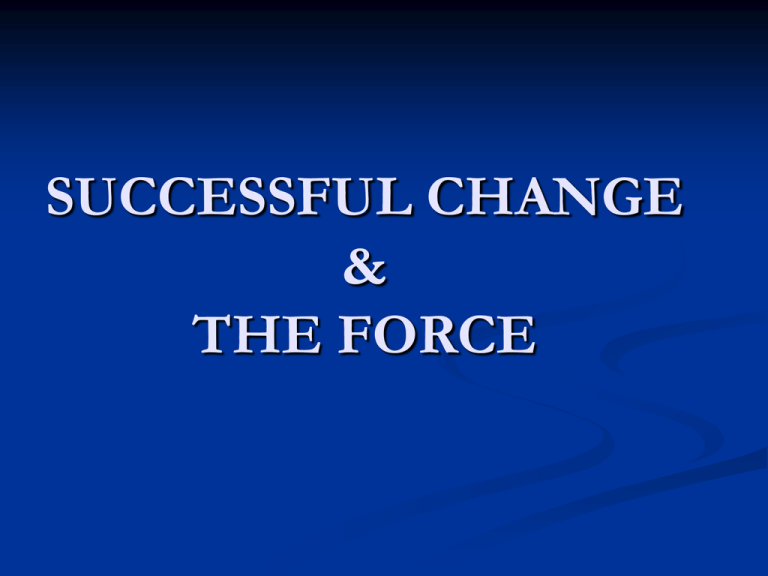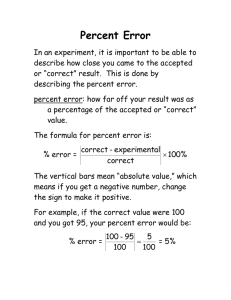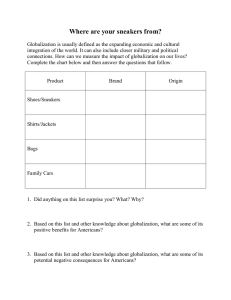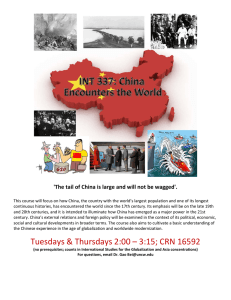SUCCESSFUL CHANGE & THE FORCE
advertisement

SUCCESSFUL CHANGE & THE FORCE Learning Objective 1. 2. 3. 4. Describing the globalization of markets and competition Describing the eight stage of change process Knowing the difference between management and leadership Describing condition of the future for organization The Globalization Recently, the challenges of business environment is different A globalized economy is creating more hazard & opportunities, this need organization change Succession organizational change reveals 2 pattern : 1. Useful change tends to associated with multiple process 2. The process employed effectively if driven by high quality leadership Economic and Social Forces Driving the Need For Major Change in Organizations TECHNOLOGICAL CHANGE INTERNATIONAL ECONOMIC • Faster and better communication • Fewer Tariffs (GATT) • Faster and better transportation •Currencies linked via floating exchange rate • More Information networks connecting people globally • More global capital flows MATURATION OF MARKETS IN DEVELOPED COUNTRIES • Slower domestic growth • More Aggressive exporters FALL OF COMMUNIST AND SOCIALIST RECIMES • More countries linked to the capitalist system • More privatization • More deregulation THE GLOBALIZATION OF MARKETS AND COMPETITION MORE HAZARDS • More Competition • Increased Speed MORE OPPORTUNITIES • Bigger Markets • Fewer Barriers MORE LARGE-SCALE CHANGE IN ORGANIZATION To avoid hazards and/or capitalize on opportunities, firms must become stronger competitors.Typical transformation methods include : - Reengineering - Quality Programs - Strategic Change -Restructuring - Mergers and Acquisitions - Cultural Change 1. ESTABLISHING A SENSE OF URGENCY • Examining the market and competitive realities • Identifying and discussing crises, potential crises, or major opportunities 2. CREATING THE GUIDING COALITION • Putting Together a group with enough power to lead the change • Getting the group to work together like a team 3. DEVELOPING A VISION AND STRATEGY • Creating a vision to help direct the change effort • Developing strategies for achieving that vision 4. COMMUNICATING THE CHANGE VISION • Using every vehicle possible to constantly communicate the new vision and strategies • Having the guiding coalition role model the behavior expected of employees 5. EMPOWERING BROAD-BASED ACTION • Getting rid of obstacles • Changing systems or structures that undermine the change vision • Encouraging risk taking and non-traditional ideas, activities, and actions 6. GENERATING SHORT-TERM WINS • Planning for visible improvements in performance or “wins” • Creating those wins • Visibly recognizing and rewarding people who made the wins possible 7. CONSOLIDATING GAINS AND PRODUCING MORE CHANGE • Using increased credibility to change all systems, structures, and policies that don’t fit together and don’t fit the transformation vision • Hiring, promoting, and developing people who can implement the change vision • Reinvirogating the process with new projects, themes, and change agents 8. ANCHORING NEW APPROACH IN THE CULTURE • Creating better performance through customer and productivity oriented behavior, more and better leadership, and more effective management • Articulating the connection between new behaviors and organizational success • Developing means to ensure leadership development and succession Management Vs Leadership Management 1. Planning & Budgeting 2. Organizing & Staffing 3. Controlling & Problem Solving Produce a degree of predictability and produce short term result Leadership 1. Establishing direction 2. Aligning people 3. Motivating and inspiring Produce change, and has the potential to produce extremely useful change The Future In the future rate of environmental movement will increase and the pressure to transform will grow. Helping individuals to better understand transformation has 2 components : 1. Relates to the various step in multistage process 2. Component is associated with the driving force behind the process Summary 1. 2. 3. Today the organizational must need to transform in catching up with The globalization Change process organization have eight stage Organization change need manager but mostly need more leadership



